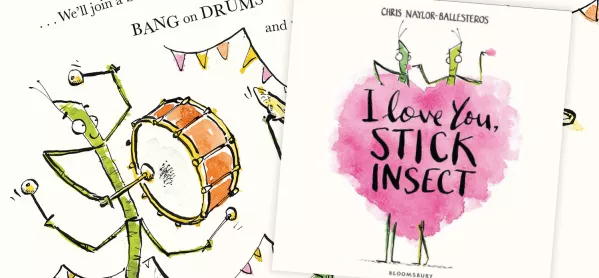- Home
- Book review: I Love You, Stick Insect
Book review: I Love You, Stick Insect

Infant-school teachers often assume that they know what sort of books interest and engage children. Adult perspectives of children’s literature, however, often differ from children’s perspectives.
I can think of numerous occasions when I have selected a book to share with the children in my class, only to find that it failed to capture their imagination or interest. Equally, I have in the past discounted a children’s book, believing it to be too rudimentary or uninspiring, only to find that the children felt quite the opposite.
My initial reaction to I Love You, Stick Insect was one of indifference. The pictures were cute but, for me, the story lacked substance, richness of language, and that certain something that makes you pick up a book time and time again to share with your class.
Children, however, are the true experts when evaluating children’s literature. Handing over the review to the pupils in my class provided a more nuanced understanding of the possibilities for this book.
The front cover of I Love You, Stick Insect immediately engaged the pupils by evoking their memories of Reception. They had previously looked after a growing family of stick insects who had on several occasions escaped from their residence, to the horror of the Reception adults and the delight of the children.
They then began to share stick-insect stories. Molly recalled when “one stick insect escaped and got trodden on”. While Oscar agreed with her account of the great escape, he debated whether any fatality had actually occurred.
When I eventually succeeded in moving the children on from an in-depth discussion about the adventures of their stick insects, they were able relate their experiences to the intrepid protagonist of the book.
Illustrations rather than text provided the entertainment factor here. The children were captivated by pictures of the stick insects enjoying the fast life; Karl and Ewan were wowed by their wave-surfing antics.
Mixed emotions
The picture of the rollercoaster prompted a lively discussion about rides at our local theme park: Maddie had never been on one, but thought it looked like fun. Harry commented that the stick-insect friends looked “terrified”. One group of children speculated on where the stick-insect bikers might be heading on their motorcycles. Thomas found the picture of the stick insect munching on four ice-creams highly amusing. Everyone seemed to like the idea of stick insects eating popcorn at the movies, which led to a discussion about the children’s favourite films.
The final pages of the book evoked mixed emotions and provided an opportunity for the children to stand in the stick insect’s shoes. Amelie believed that the insect was feeling sad “because he had lost his friend”. Isabel thought he looked worried because he had “broken the stick’s arm”.
A number of children suggested that the story was about friendship and endurance. This opened my eyes to the possibility of using the book to promote learning related to our school values and the work we had been doing to develop the children’s sense of empathy.
I Love You, Stick Insect received a thumbs-up from all 30 children in the class. When it was put in the book corner, it became a popular choice to look at independently and share.
I concluded that the book had a lot more potential than I had originally assumed, and conceded that, once again, it was the pupils who proved to be the experts on what engages children in the literary world.
Megan Taddeo is Year 1 teacher at Netley Marsh CE Infant School in Southampton
Keep reading for just £1 per month
You've reached your limit of free articles this month. Subscribe for £1 per month for three months and get:
- Unlimited access to all Tes magazine content
- Exclusive subscriber-only stories
- Award-winning email newsletters